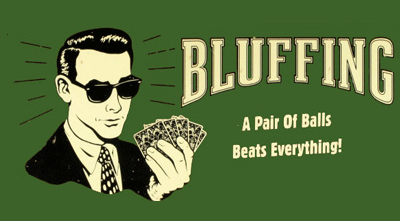|
Art Of The Bluff: Central Banker Edition
Daniel Drew, 1/15/2015  Tweet Strong means weak. When a poker player is bluffing, sometimes he will overcompensate and act too strongly to make sure his opponent gets the message. As I wondered if we could have foreseen the Swiss National Bank's surprise move to abandon the cap on the franc, I decided to look for clues in the central bank statements prior to the surprise. What I found was repetitive language about defending the exchange rate that seemed suspicious. On December 18, 2014, Thomas Jordan, SNB chairman, said enforcement of the exchange rate was "key" three times. He said they would defend it with the "utmost determination" twice. This is for a statement that was barely over 2 pages. So it wasn't some summary after a long-winded speech. A week earlier, he also said the exchange rate enforcement was "key" two times. The phrase "utmost determination" was there again as well. Even more interesting was the statement on November 23, as Jordan engaged in some serious mental gymnastics to try to deny that he had handed over his job to Mario Draghi: "At this stage, you might object that, through the minimum exchange rate against the euro, the SNB has already, in point of fact, adopted foreign money and handed over its monetary policy to a foreign central bank. Such a view of affairs would be incorrect. The minimum exchange rate is a measure which we adopted in order to fulfill our mandate in the interests of the country as a whole. The world economy is currently in an extremely difficult situation and the minimum exchange rate allows us to maintain appropriate monetary conditions and secure our long-term capacity to act. The minimum exchange rate is therefore an expression of our national policy sovereignty and the SNB�s lived independence, not a sign that we have given up our autonomy."Never mind the fact that he single-handedly bankrupted FX brokers and possibly thousands of retail traders. He had to make it clear that he was running the show - not Draghi. Also, it's a convenient way to give himself that 20% raise he's been hoping for. When he was appointed chairman in April 2012, Jordan said they would defend the exchange rate "regardless of what happens on financial markets." After the successful bluff, he justified himself, "If you decide to exit such a policy, you have to take the markets by surprise." There was one thing he wasn't bluffing about. In the December 18 statement, he said, "Without the minimum exchange rate, price stability in Switzerland would be seriously compromised."  Chart: FinViz If you are a high rolling market participant running a billion dollar fund who was on the wrong side of Thomas Jordan's bank busting bluff, take a step back, and realize that no matter how many billions of dollars you have to your name, a central banker with a million dollar salary calls the shots. When Phil Hellmuth asked Tony G if he looked at his cards, he said no. Phil went all in, and Tony G flipped over Ace King. Phil said, "Oh you lied!" to which Tony G responded, "Of course I lied! It's poker, Phil - what do you think this is?" Hellmuth lost $30,500 in one hand as a result of his trust in Tony G, who eventually told Phil he should retire. I bet Thomas Jordan is thinking the same thing about all the macro hedge fund managers out there. And Jordan gets a 20% raise because he's paid in francs. Of course I lied! It's central banking! |